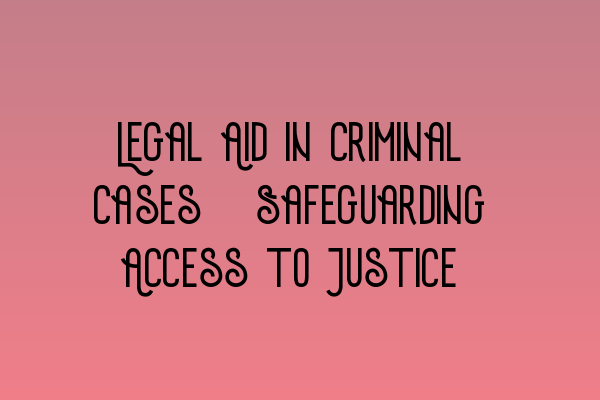Legal Aid in Criminal Cases: Safeguarding Access to Justice
In the criminal justice system, the principle of access to justice is of utmost importance. It ensures that all individuals, regardless of their financial situation, have the right to legal representation and a fair trial. Legal aid plays a crucial role in safeguarding this fundamental right and ensuring that everyone has equal access to justice.
What is Legal Aid?
Legal aid refers to financial assistance provided by the government to individuals who cannot afford legal representation and advice for their criminal cases. It aims to bridge the gap between those who can afford legal services and those who cannot, ensuring that everyone has equal access to justice.
Legal aid covers a wide range of legal services, including expert advice, representation in court, and assistance with legal documentation. Its primary objective is to ensure that individuals are not denied their basic rights due to financial constraints.
The Importance of Legal Aid in Criminal Cases
Access to legal aid is crucial in criminal cases as it helps to protect the rights of the accused and ensures a fair trial. Without legal representation, individuals may lack the knowledge and skills required to present their case effectively, leading to an imbalance in the criminal justice system.
Legal aid ensures that individuals have access to competent and experienced criminal solicitors who can provide guidance and support throughout the legal process. They can help navigate complex legal procedures, gather evidence, and present a strong defense.
Moreover, legal aid helps prevent wrongful convictions by enabling thorough investigation and examination of the evidence. It ensures that individuals have access to the resources necessary to challenge the prosecution’s case and present their defense effectively.
Challenges Faced by Legal Aid in Criminal Cases
Despite its importance, legal aid in criminal cases faces several challenges. One significant challenge is the limited availability of legal aid funding. In recent years, there have been significant cuts to legal aid budgets, resulting in reduced access to representation.
The eligibility criteria for legal aid can also be restrictive, leaving some individuals without financial support, even if they cannot afford legal representation. This can result in a significant disparity in access to justice.
Furthermore, the complexity and length of criminal cases can put a strain on legal aid providers, leading to delays and inadequate representation. This may compromise the quality of defense and impact the overall fairness of the trial process.
Safeguarding Access to Justice: The Way Forward
Recognizing the importance of legal aid in criminal cases, it is crucial to take steps towards safeguarding access to justice. This involves addressing the challenges faced by legal aid and ensuring that individuals have equal opportunities to receive adequate representation.
One approach is to increase investment in legal aid services. Adequate funding can help improve the availability and quality of legal representation, enabling individuals to receive the support they need throughout the legal process.
Additionally, reforming the eligibility criteria for legal aid can ensure that those in need receive the necessary financial support. This may involve reassessing income thresholds and considering other factors that may affect an individual’s ability to afford legal representation.
Collaboration between legal aid providers, government agencies, and other stakeholders is essential in promoting access to justice. Working together can lead to better coordination of services, improved efficiency, and a more robust support system for individuals involved in criminal cases.
Conclusion
Legal aid plays a crucial role in safeguarding access to justice in criminal cases. It ensures that individuals, regardless of their financial situation, have equal opportunities to receive legal representation and a fair trial. While there are challenges to overcome, it is essential to prioritize and invest in legal aid services to uphold the principles of justice and fairness in the criminal justice system.
For more information on legal education and preparation for the SQE exams, please check out our related articles:
- SQE 1 Practice Exam Questions
- SQE 1 Practice Mocks FLK1 FLK2
- SQE 2 Preparation Courses
- SQE 1 Preparation Courses
- SRA SQE Exam Dates
